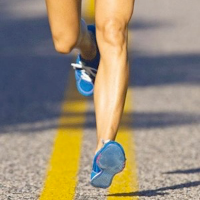I’ve received several questions on lactate threshold field tests lately. I will answer one today, and the next one in a few days. This question is about using the field-tested heart rate that you estimate in your cycling classes for running. I also give you information about comparing LT with an elliptical machine. I’ve received several questions on lactate threshold field tests lately. I will answer one today, and the next one in a few days (which has to do with explaining the benefit of field testing to management).
Melissa asks:
I hosted a field test for some of my cycling participants and one member had a question that I wasn’t exactly sure of the answer. She asked if her LT heart rate generated from the field test is applicable to her workouts on the treadmill/running. My initial thought was no, not really because if she did a similar test on the treadmill based upon how strong of a runner (beginner vs competitive) it may allow or not allow her to get to the same level-training of specificity right? But then I am not 100% sure. Can you help me sort this out? Thank you!
You are partially correct Melissa! Certainly one’s skill and fitness level in a sport will affect their lactate threshold intensity. But even when an athlete is skilled in both cycling and running, the latter will generally elicit higher heart rates for both sub-max and LT efforts. This is because running uses more muscles, is more vertical than cycling (and therefore must resist gravity more), and the body is not supported in any way, like the saddle supports a cyclist. Typically, triathletes will have three sets of training zones, one for each sport, with running being the highest, and swimming the lowest. I’ve heard that they can be as much as 10 beats apart, but that depends on one’s technique. You are always going to be more efficient at your preferred (and most practiced) sport.


You are welcome Traci. I see this question come up quite often on various indoor cycling and other training forums.
Thanks for the great explanation! I was just asked the same thing recently and was happy to stumble on such a thorough answer!